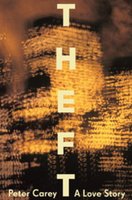Carey get out your cane
 The story of my brief infatuation with Carey's prose goes like this: The Fat Man In History was just fine, improving on multiple re-readings. Bliss stretched the friendship almost beyond endurance, and about half way through Oscar and Lucinda as the church was floating down the river the whole edifice sank without a trace, never to be salvaged.
The story of my brief infatuation with Carey's prose goes like this: The Fat Man In History was just fine, improving on multiple re-readings. Bliss stretched the friendship almost beyond endurance, and about half way through Oscar and Lucinda as the church was floating down the river the whole edifice sank without a trace, never to be salvaged.So it was solely with Booker completism in mind that I tackled Theft - only to be pleasantly surpised by the opening few paragraphs, which had a narrative clarity and urgency which recalled the finest moments of The Fat Man
But it was not to last. For half of Theft is a tale told by an idiot. As you might expect, then, it is full of sound and fury, but just doesn't signify. In alternate chapters Carey affects rather unconvincingly the voice of some mindless rural dolt from his (real) home town, Bacchus Marsh VIC, but it is the voice of an idiot more savage than savant. This complex and over-elaborate device rapidly becomes tedious, and slows the narrative down to a skin-crawl.
Theft tries to be about art, and moral rights, and also as the subtitle implies about love. We don't learn more than we knew already about any of these subjects. Too many of the characters can be sketched on the back of an envelope - the too cute root, the rich drug addled scion, the nasty enigmatic art buyers... even Slow Bones the duffer brother reads like a gloss on Dostoyevsky's Myshkin, or Steinbeck's Lenny.
And the overbearing tweeness of the name-borrowing, the all-too-knowing phrases from popular song, the Condé Nasty travelogue and the slender sub-Grisham plot. Even at 279 double spaced large font pages, by half way through I was skimming Hugh's automatic/automaton writing and longing for the end...
0 Comments:
Post a Comment
<< Home